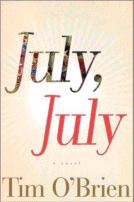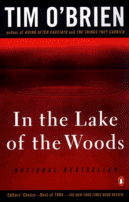Tim O'Brien received the 1979 National Book Award in fiction for
Going After Cacciato. His novel
The Things They Carried
won France's prestigious Prix du Meilleur Livre Étranger and
the
Chicago Tribune's Heartland Prize, and was chosen as
one of the best books of 1990 by the
New York Times Book
Review.
In the Lake of the Woods was named the best
work of fiction in 1994 by
Time and selected by the
New York Times Book Review as one of the best books of
the year. It also won the 1995 James Fenimore Cooper Prize for
historical fiction, and, along with
Tomcat in Love,
O'Brien's most recent novel, was a national bestseller.
The main action of July, July takes place at a college reunion. Have you attended such a reunion?
No. Probably never will. But in a sense, having written this book, I feel as if I've attended by way of imagination. Which is how novelists often think: "What if?" And I hope my readers will also feel as if they've gone through the emotional ups and downs of a thirtieth reunion.
Like your characters, did you graduate from college in 1969?
I graduated in 1968. But close enough. That's my era.
What inspired you to write the novel?
I got a call one day from the fiction editor at
Esquire, Rust Hills, who asked if I'd like to write a very short story, one that would fit on a single printed page. I took him up on the offer and produced a piece that now stands as one of the important reunion chapters in
July, July. This short, six-hundred-word piece left me wanting to know more about the reunion itself and more about these people I'd invented. I yearned to learn in greater detail about their dreams and disappointments, their joys, their secrets, their successes and failures, all the changes that are wrought on the human spirit by the passage of time. I was interested, of course, in my own baby-boom generation, but I was even more fascinated by these particular characters. Especially the women: Jan and Amy and Marla and Spook and Karen and Dorothy and Paulette and Ellie.
So was this a character-driven book?
Oh, yes. If readers come to love these people half as much as I do, then I will be a very satisfied author.
How do you explain your interest in all these female characters?
I suppose in part it was a technical challenge, to prove to myself that I could do it, that as a writer I could portray convincing, detailed, intelligent, compelling women. More important, it seemed to me that most of the fiction set in the watershed era of the late 1960s focuses on stories about men — the pressures of war, draft-dodging, and so on. But for every man who went to Vietnam, or for every man who went to Canada, there were countless sisters and girlfriends and wives and mothers, each of whom had her own fascinating story, her own tragedies and suffering, her own healing afterward. I mean, sure, the war was important back then, but Vietnam wasn't everything. There's a passage in
July, July that speaks to this question and represents for me the core of the book:
"The war went on. People ate Raisin Bran. There were new orphans and widows and Gold Star mothers. Three thousand and twenty American soldiers died that summer, and more than seven thousand Vietnamese. People took aspirin for their headaches. People requested doggie bags at fancy restaurants. Dow Chemical made a killing. From sea to sea, along country roads, in great sleeping cities, there were petty jealousies and erotic fantasies and grocery lists and upset stomachs. The earth kept spinning . . . For Jan Huebner, as for most others, the summer of 1969 would later call to mind not headlines, nor global politics, nor even a war, but small, modest memories of small, modest things: rumpled beds and ringing telephones and birthday cakes and dirty pictures and catchy tunes about everyday people. There was a fatal Ferris wheel accident in Oregon. There were Krazy Day sales on a thousand sun-drenched Main Streets. Jan Huebner met her husband . . . Small, simple things, yes, but as in some great nationwide darkroom, the most ordinary human snapshots would be fixed in memory by the acidic wash of war — the music, the lingo, the evening news."
So after writing extensively about Vietnam, you're now interested in the war's impact on the people at home?
Yes, in part. But
July, July is mostly about how these eleven characters dealt with those things over the past thirty years, long after the war ended. The erosion of ideals. Or the transformation of ideals. Back in my college years, for instance, we used to fiercely debate the ins and outs of the Tonkin Bay Resolution. Now baby boomers are talking about divorce and breast cancer and children and betrayal and loss and grief. Our politics have become personal. The world has whittled itself down to basics.
Why did you choose the title July, July?
The title is meant to evoke a sense of who we once were, who we've now become. July 1969, July 2000: that's the time frame of the novel. Beyond that, I'm also attracted to the title's sound, — its music, its rhythm, its wistfulness, its choral quality.
Do you have a favorite character?
Maybe, but I'd never say. To do that would be like a father singling out a favorite child. The other kids in the family would be horribly hurt. I will admit, though, that I love Spook Spinelli's incredible gutsiness, her way of attacking the world, the way she can somehow manage a pair of marriages to two different men at the same time. I love Marv Bertel's vulnerability, his humor, his self-deprecation, his undying love for Spook over thirty years. I love Dorothy Stier almost in spite of myself. She represents everything I am not — a rich, conservative, prim-and-proper country-club type. Of all the characters, Dorothy probably undergoes the biggest changes in the course of the reunion. I had fun watching her drop acid in those final chapters, watching her loosen up, listening to her goofy chatter. As an author, I wanted to keep feeding her more drugs.
Tell us about the novel's structure.
The spine of the novel — the main action — occurs during a two-day college reunion in the heart of summer, in July 2000. We see these people as they are right now, in middle age, flirting, regretting, reminiscing, exacting revenge, falling in love, falling out. But every once in a while the novel jumps into the past, into one of the character's lives back in 1969 or 1979 or 1985 or whenever.
For each of the characters I tried to choose a pivotal, fork-in the-road, edge-of-the-cliff moment. For example, how Jan Huebner met her husband, an oily, creepy man who would walk out on her thirty years later. Or how Paulette Haslo's life as a Presbyterian minister changed forever on the night she burgled an old woman's house. Or the story of Billy McMann's flight to Canada. Or how Marv Bertel told a silly lie one evening that also changed his life forever.
Are these characters based on real people or real events?
Oh, man. What do I say? For me these characters are real. I know David Todd and Marla Dempsey and Paulette Haslo and Spook Spinelli as well as I know anyone in the so-called real world. Granted, this is fiction and the characters in
July, July are imaginary, but for me — and I hope for my readers — these people will live on in memory long after the book is finished, just as old friends endure in memory long after they've said goodbye.
Will younger readers who did not live through the Vietnam period be able to identify with these characters and enjoy the story?
What finally matters to a reader, I believe, is a good story. We can all identify, for example, with Marv Bertel as he says something he shouldn't have and then has to live with the consequences. Similarly, we can all imagine attending a reunion — the charged emotions of memory, the deferred dreams and lost loves, the sense of passing time and how swiftly our lives seem to vanish. Any woman, old or young, can imagine what she might say to that guy who dumped her, and what the guy might say in response, and what might then develop between them afterward. One of the primary themes of
July, July has to do with this very issue: how the really important things are timeless, or entirely removed from time.
Does this explain why you've inserted an angel into the story? The character Johnny Ever appears in different disguises throughout the novel — as a crazed disk jockey, a blackjack dealer, a TV evangelist, a policeman, a next-door neighbor.
Well, I'm not sure if Johnny is an angel or a devil or a voice of conscience or just a weird metaphysical middleman. But yes, Johnny is meant to lift the story out of time, to remind both the characters and the reader that human beings have gone through certain universal troubles and joys throughout history, and to remind us of those abiding mysteries and unknowns that envelop all of human experience.
Posted with permission of the publisher.



